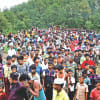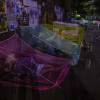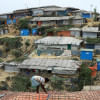Dengue patients higher in Rohingya camps than in rest of the country

A total of 39 people have died from dengue in the country so far this year.
Of them, 17 were from Cox's Bazar, 17 from Dhaka, four from Barishal and one was from Chattogram.
According to the Directorate General of Health Services (DGHS), 9,837 people have been infected with dengue across the country since yesterday (September 14, 2022). Of them, 7,801 are from the capital. The maximum number of people infected outside the capital is 898 in Cox's Bazar and all of them are Bangladeshi citizens.
However, sources at the civil surgeon's office in Cox's Bazar said 12,419 people have so far been infected with dengue only in the district's Rohingya camps this year and it claimed the lives of 24 Rohingyas.
At the beginning of the dengue season, experts had hinted that the number of such patients may increase in Cox's Bazar this year.
Entomologist Prof Kabirul Bashar, who was in a team of surveyors conducting a study on mosquitoes in Cox's Bazar, told The Daily Star, "In May, we surveyed the Rohingya camps and found the abnormal presence of Aedes mosquitos. We had said then that dengue could become an epidemic in Cox's Bazar this year."
"The actual number of dengue patients in Cox's Bazar is likely to be even higher," he said.
Stating that there is not much initiative in Cox's Bazar to kill Aedes mosquitoes, the entomologist said, "There should be a central plan at the state level to control Aedes mosquitoes. Otherwise, one after another districts will continue to turn into dengue hotspots."
Civil Surgeon of Cox's Bazar, Md Mahbubur Rahman said, "We already knew that dengue infection in Cox's Bazar could increase this year. Those in charge of killing mosquitoes had been informed already. We have also discussed this issue in the monthly meetings of the district."
"Most of those who died of dengue are Rohingya people. Many of them do not want to go to the doctor. They believe in the treatment of kabirajs. They only go to the doctors when the situation becomes severely grave. That's why the number of deaths in the district is a bit higher," he said.
"There was a water body in one of the Rohingya camps which was the main source of spreading dengue's vector in all the camps," said Shah Fahim Ahmed Faisal, medical officer (disease control) of Cox's Bazar civil surgeon's Office.
"Dengue first spread in one camp, then it spread to nearby camps," he added.
When asked about what kind of measures were taken to prevent dengue, he only talked about the preparatory measures. But he could not give any information about what kind of measures were taken to kill Aedes mosquitoes.
However, the municipality's activities to clean the drain have increased during the last two weeks, he said.
"Proper steps have been taken in the Rohingya camps, I think. However, these initiatives needed to be taken earlier," he said.
Cox's Bazar Nagarik Forum President ANM Helal Uddin told The Daily Star, "The dengue outbreak has increased in Cox's Bazar mainly due to mismanagement of the municipality. We have not seen any visible work by the municipality to kill mosquitoes. They are fogging sometimes. That too not everywhere. When fogging in one place, mosquitoes fly to another place. Then they come back again. That's how mosquitoes grow. No effective initiative has been taken to kill mosquitoes. We, the people of Cox's Bazar, are deprived of civic services."
Cox's Bazar Municipality Chief Executive Officer AKM Tariqul Alam told The Daily Star, "We make announcements using loudspeakers, distribute leaflets to raise awareness and do fogging to control Aedes mosquito. Fogging is done regularly in areas where there are more patients. Where there are fewer patients, fogging is done every other day."
According to the civil surgeon's office, patients are very high in number in five areas of the Cox's Bazar. The matter was also reported by the municipality. However, no special measures or programmes were taken in those areas except fogging, said the chief executive officer of the municipality.
In this regard, entomologist Dr Manjur Ahmed Chowdhury said that in those five areas, there needs to be a lot more fogging, and killing of mosquitoes.
Residents, including children, of those areas, have to cover their bodies, especially hands and feet. They have to use mosquito nets while sleeping. Everyone needs to get tested for the disease and it also needs to be monitored if it is moving to other areas, the entomologist added.
Cox's Bazar Mayor Mujibur Rahman did not respond to several phone calls and text messages The Daily Star made to his phone for comments.

 For all latest news, follow The Daily Star's Google News channel.
For all latest news, follow The Daily Star's Google News channel. 








Comments